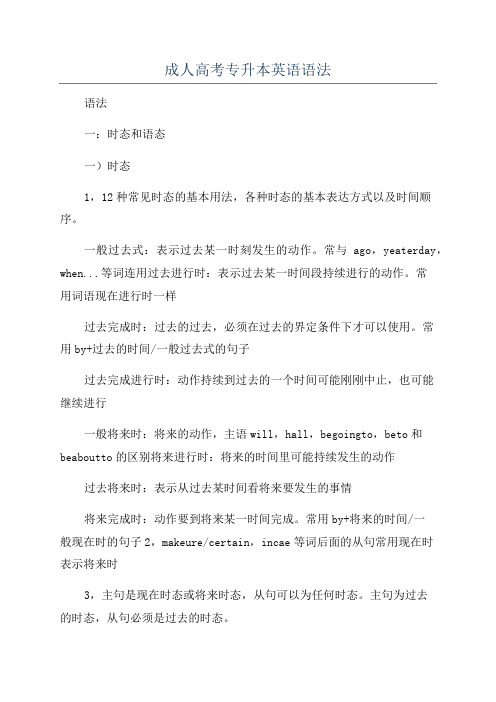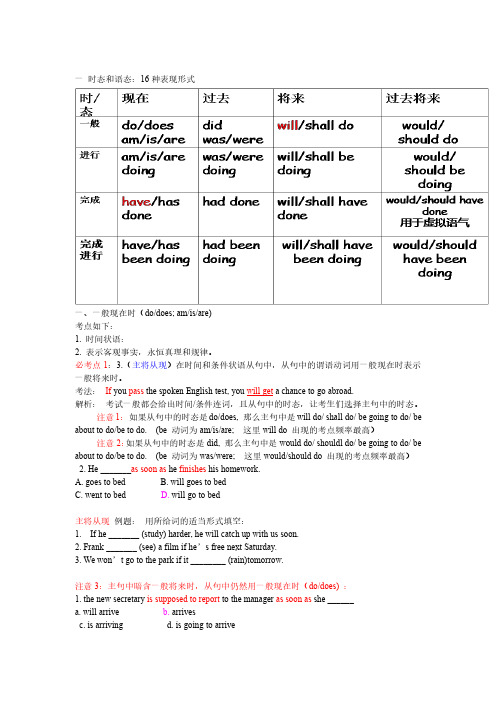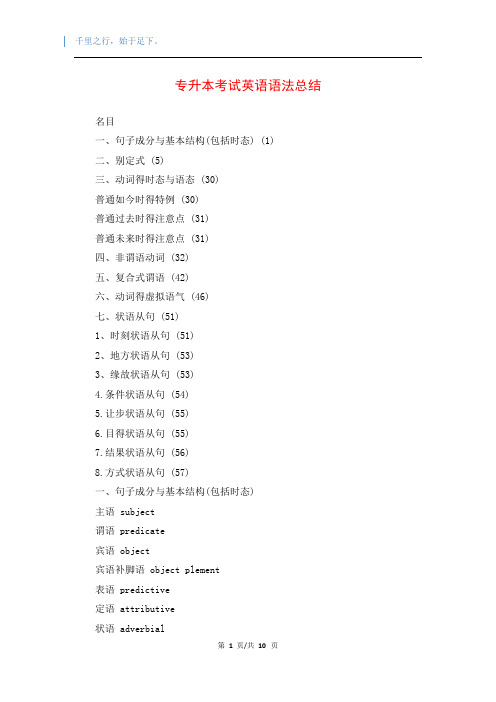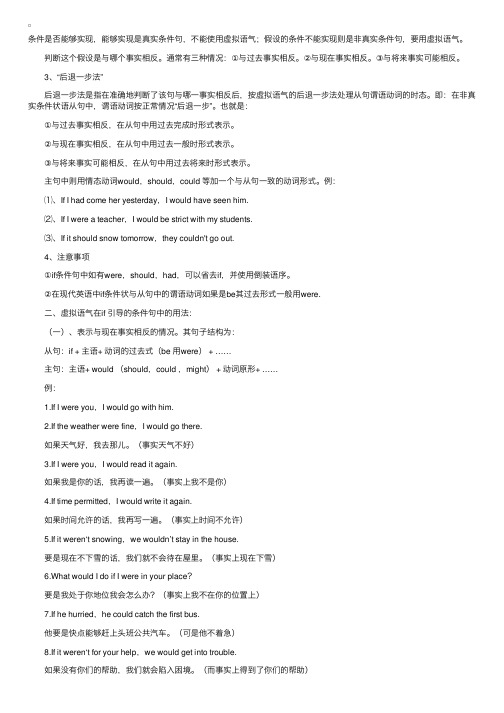成人高考专升本英语语法 - 副本
成人高考函授专升本复习成考英语题型分析及解题技巧

A. Because B. While C. If
Add Text 点击此处添加标题
D. Since
【解析】根据后面的I had been born in the 16th century可知这只是个假设,是一个虚拟语气的
条件句。故前面要用 if 引导。
Part Three 完形填空
3. 利用固定搭配解题
如:They couldn’t read or write. They didn’t like to work and they never ___12___
baths.
Add Text
A. took
点击此处添加标题
B. washed
C. ran
D. covered
【解析】本题考查的是固定搭配take a bath,意为“洗澡”。
4. 得出结论,推论及概括
Part Four 阅读理解
[解题技巧] 1. 两种方法 略读法和查阅法 2. 三个侧重 ➢ 首尾句、首尾段 ➢ 转折词 ➢ 长难句 3. 四种题型 ✓ 主旨大意题 ✓ 词语理解题 ✓ 事实细节题 ✓ 推理判断题
Add Text 点击此处添加标题
Part Four 阅读理解
5. 单纯考查语法结构的题目较少,重点是考查上下文联系。 [解题技巧] 1. 段落第一句话是主题来源! 2. 根据上下文选择和调整答案
Part Three 完形填空
1. 跳读首尾句进行预测 一般来讲,完形填空的首、尾句通常是不挖空的。先跳读这两句,便可判断体裁,猜想它要讲什么。
若首句交代了when, where, who, what,即四个W,那么就是记叙文,很可能就是一个故事;若首句是提出 或解释说明某事物,一般来说是说明文;若首句提出一个论点,那么就是议论文。
全国成人高考专升本英语-考点汇编

第一部分语法第一章名词考点名词的复数形式1.名词的规则复数形式规则一:一般情况下,名词词尾直接加-s.规则二:以-s,-x,-ch,-sh结尾的名词,一般加-es。
规则三:“辅音字母+y”结尾的名词,变y为i,再加-es。
“元音字母+y”结尾的名词,词尾直接加-s。
规则四:“辅音字母+o”结尾的名词,有生命+es;“辅音字母+o”结尾的名词,无生命+s;“元音字母+o”结尾的名词,一般+s。
规则五:以-f或-fe结尾的名词,一般变-f或-fe为v,再加-es。
规则六:不规则变化记心中。
(1)改变单数名词的内部元音使其变成复数man—men;foot—feet(2)在单数名词词尾加-ren或-enchild—children;ox—oxen(3)复数形式与单数形式相同sheep—sheep;Chinese—Chinese(4)一些外来词仍然保留原来的名词复数形式basis—bases;thesis—theses2.合成名词的复数形式(1)如主体词为名词,将主体词改为复数。
son-in-law——sons-in-law女婿(2)如没有主体名词,则在最后一个词后加复数同尾。
grown-up——grown-ups成年人(3)以man和woman构成的合成名词,各个成分都变为复数。
第二章冠词考点1不定冠词的基本用法1.用在单数可数名词前表示“一,一个”。
There is a picture on the wall.墙上有一幅图画。
2.表示一类人或物,指同类中的任何一个,a或an不必翻译。
Even a child can answer this question.就是小孩子也能回答这个问题。
3.第一次提到某人或某物时,用不定冠词a或an,起介绍作用。
A girl wants to see you.一位姑娘要见你。
4.不定冠词用于单数可数名词前表示身份、职业,尤其用在作表语或宾语补足语的名词前。
She is a high school teacher.Her name is Li Fang..用于专有名词前,表示“一位叫……的人”。
成人高考专升本英语语法

成人高考专升本英语语法语法一:时态和语态一)时态1,12种常见时态的基本用法,各种时态的基本表达方式以及时间顺序。
一般过去式:表示过去某一时刻发生的动作。
常与ago,yeaterday,when...等词连用过去进行时:表示过去某一时间段持续进行的动作。
常用词语现在进行时一样过去完成时:过去的过去,必须在过去的界定条件下才可以使用。
常用by+过去的时间/一般过去式的句子过去完成进行时:动作持续到过去的一个时间可能刚刚中止,也可能继续进行一般将来时:将来的动作,主语will,hall,begoingto,beto和beaboutto的区别将来进行时:将来的时间里可能持续发生的动作过去将来时:表示从过去某时间看将来要发生的事情将来完成时:动作要到将来某一时间完成。
常用by+将来的时间/一般现在时的句子2,makeure/certain,incae等词后面的从句常用现在时表示将来时3,主句是现在时态或将来时态,从句可以为任何时态。
主句为过去的时态,从句必须是过去的时态。
二)被动语态1,不能用被动语态的情况:A:不及物动词B:表示状态而不是动作的词,如cot,fit,lack,want,wihuit等2,感官动词(hear,feel,litento,ee,watch,notice等),使役动词:have,make,help,let等。
被动时,需要将to补上。
3,被动语态一般都与其他考点综合考察,当看到选项有被动选项时,首先应该考虑是否具有被动关系。
二,非谓语动词一)动词不定式1,动词不定式短语作主语时,往往放在谓语动词的后面,用引导词it作形式主语。
如果不定式作宾语而又跟有补语,这时,通常要用"it"作形式宾语,而将不定式放到补语后面去。
2,动词不定式的逻辑主语:1)iti+adj+forb.常用于表示事物的特征特点,表示客观形式的形容词,如eay,hard,difficult,intereting,impoible等:2)iti+adj+ofb.的句型一般表示人物的性格,品德,表示主观感情或态度的形容词,如good,kind,nice,clever,foolih,right等。
2018成人高考专升本《英语》词汇与语法复习【一】

【导语】你长着⼀对翅膀。
坚韧地飞吧,不要为风⾬所折服;诚挚地飞吧,不要为⾹甜的蜜汁所陶醉。
以下是⽆忧考为⼤家整理的《2018成⼈⾼考专升本《英语》词汇与语法复习【⼀】》供您查阅。
【篇⼀】 1. Now people use the word Ms instead of Miss or Mrs before the name of in business letters.A. woman managerB. women managerC. woman managersD. women managers 2. The children cooked some by burning and branches.A. potatos…leavesB. potatoes…leafsC. potatos…leafsD. potatoes…leaves 3. The young students like and Mark novels very much.A. Dickens…Twain’sB. Dickens’… TwainC. Dickens’s…Twain’D. Dickens’…Twain’s 4. film includes some recently discovered newsreels of World War II.A. The; theB. A; theC. The; 不填D. A; 不填 5. Although he had studied very hard, John had hope of passing the exam.A. littleB. anyC. a littleD. some 6. It was terrible. One passenger was killed, and was badly hurt.A. the othersB. restC. the otherD. the rest 7. The jacket doesn’t fit Terry, as he has huge body and the jacket is small.A. such a; suchB. such a; soC. so; soD. so; such a 8. Traveling in England, it will be cheaper if you buy a return ticket on the train.A. moreB. veryC. quiteD. even 9. “Must I return the book to the library in a week?” “No, you .”A. couldn’tB. mustn’tC. needn’tD. won’t 10. “Why isn’t John in class?” “He be sick, or he’d have been here already.”A. shouldB. mayC. mustD. would 11. I don’t want you to pay for me. I’ll pay for ______.A. mineB. meC. myselfD. my own 12. Although he had not studied very hard, John had ______ hope of passing the exam.A. littleB. anyC. a littleD. some 13. Lisa did not come for the piano lesson yesterday. She have missed the bus.A. wouldB. mightC. shouldD. ought to 14. Why is the rubbish still here? It ought to yesterday.A. be thrown awayB. have thrown awayC. have been thrown away D. throw away 15. We a walk when it started to rain.A. takeB. tookC. are takingD. were taking 1. Now people use the word Ms instead of Miss or Mrs before the name of in business letters.A. woman managerB. women managerC. woman managersD. women managers 2. The children cooked some by burning and branches.A. potatos…leavesB. potatoes…leafsC. potatos…leafsD. potatoes…leaves 3. The young students like and Mark novels very much.A. Dickens…Twain’sB. Dickens’… TwainC. Dickens’s…Twain’D. Dickens’…Twain’s 4. film includes some recently discovered newsreels of World War II.A. The; theB. A; theC. The; 不填D. A; 不填 5. Although he had studied very hard, John had hope of passing the exam.A. littleB. anyC. a littleD. some 6. It was terrible. One passenger was killed, and was badly hurt.A. the othersB. restC. the otherD. the rest 7. The jacket doesn’t fit Terry, as he has huge body and the jacket is small.A. such a; suchB. such a; soC. so; soD. so; such a 8. Traveling in England, it will be cheaper if you buy a return ticket on the train.A. moreB. veryC. quiteD. even 9. “Must I return the book to the library in a week?” “No, you .”A. couldn’tB. mustn’tC. needn’tD. won’t 10. “Why isn’t John in class?” “He be sick, or he’d have been here already.”A. shouldB. mayC. mustD. would 11. I don’t want you to pay for me. I’ll pay for ______.A. mineB. meC. myselfD. my own 12. Although he had not studied very hard, John had ______ hope of passing the exam.A. littleB. anyC. a littleD. some 13. Lisa did not come for the piano lesson yesterday. She have missed the bus.A. wouldB. mightC. shouldD. ought to 14. Why is the rubbish still here? It ought to yesterday.A. be thrown awayB. have thrown awayC. have been thrown away D. throw away 15. We a walk when it started to rain.A. takeB. tookC. are takingD. were taking【篇⼆】 1. Not only you but also I mistaken.A. amB. hadC. wereD. have 2. Hardly the door when he rushed into the office out of breath.A. I openedB. did I openC. I had openedD. had I opened 3. Not until the early years of the 19th century what heat is.A. man knewB. didn’t man knowC. man did knowD. did man know 4. Ten days long enough for Mr Carter to finish his design. He doesn’t need any more.A. isB. has beenC. wasD. had been 5. Try your best ______ you’ll certainly succeed this time.A. soB. andC. orD. for 6. I’m sure he understands ______ you feel. He’s very clever.A. whenB. whatC. whetherD. how 7. I visited Jiuzhaigou last autumn. Never in my life so beautiful a place like that.A. I had seenB. did I seeC. had I seenD. I shall see 8. lovely weather we have been having these days?A. HowB. WhatC. How aD. What a 9. Lets do the cleaning right after class, ?A. will youB. shall weC. do youD. can we 10. “Have you seen Ann at the concert?” “No, but she said she would come, ?”A. didn’t sheB. wouldn’t sheC. did sheD. would she 11. We can easily get from the computer has been stored in it.A. whatB. thatC. whichD. anything 12. This is the only English-Chinese dictionary could be found in the teachers’ reading-room.A. whatB. whichC. itD. that 13. I’d like to join the tennis club which my friend belongs.A. toB. forC. withD. in 14. I asked two people to help me start my car, but ____ of them knew what to do.A. eitherB. noneC. bothD. neither 15. We’re all looking forward to seeing you again, and we’ll be very disappointed if you .A. didn’t comeB. don’t comeC. won’t comeD. hadn’t come 16. When Lenin in Europe he began to fulfill his plans step by step at once.A. gotB. arrivedC. reachedD. went 17. Please be sure to telephone me next time you ______ to our city.A. will comeB. comeC. cameD. are coming 18. The boy ______ the hole with water, but no rabbits ran out of it at all.A. pouredB. addedC. filledD. covered 19. The nurse his temperature at twelve o’clock and then gave him some medicine.A. countedB. measuredC. hadD. took 20. All the big buildings in the city were into hospitals during the Second World War.A. becomeB. turnedC. grownD. made 21. This plan against my wishes, so I won’t agree with you unless you made some changes in it.A. goesB. comesC. fightsD. think 22. It took them more a whole day to have their house painted. But it was worth the effort.A. and moreB. or lessC. or moreD. than that 23. With five hungry children round the table, the little food in the plate disappeared .A. for a long timeB. on timeC. in timeD. in no time 24. He seemed to have earned a great of money during the years. He bought another new car.A. lotB. manyC. muchD. deal 25. People shouted at him, yet he silent all the time.A. remainedB. wentC. turnedD. grew 26. I met the new manager this morning and we basic policies.A. looked onB. got onC. agreed onD. agreed with 27. They couldn’t what the teacher was trying to explain.A. knowB. graspC. holdD. think 28.The dancer and singer 24 years old, and I am 24.A. isB. areC. wasD. were 29. Philip ______ her invitation to go to her farm for his holiday because he was too busy.A. receivedB. acceptedC. refusedD. got 30. The young people in the city often come to the old man to ______ him for advice.A. begB. askC. offerD. invite 答案: 1-5:ADDAB 6-10:DCBBA 11-15:ADADB 16-20:BBCDB 21-25:ABDDA 36-40:CBACB 【篇三】 1. It is well known that Tomas Edison __________ the electric lamp.A. discoveredB. FoundC. developedD. invented 2. I couldn’t enter the lab because I had ____________ the key in my office.A. takenB. leftC. missedD. got 3. I regret ____________ you that we are unable to offer you employment. A. informing C. to inform B. having informed D. to have informed 4. The chairman has informed us that he ____________a few minutes late after the meeting begins. A. has arrived C. could arrive B. should arrive D. may arrive 5. She had made __________many mistakes in the article that we couldn’t catch what she meant.A. suchB. thatC. soD. as 6. I sincerely ____________him to make great progress with his new job in a short tine.A. expectB. believeC. thinkD. instruct 7. Is ____________ necessary to complete the design before National Day?A. thisB. thatC. itD. such 8. She said she would live in London for ____________ four or five years.A. anotherB. othersC. otherD. the others 9. Mr. Smith use d t o s m o k e _ _ _ _ _ _ _ _ _ _ _ _ b u t h e h a s g i v e n i t u p n o w . / p > p b d s f i d = " 2 1 0 " > 0 0A . b a d l yB . s e r i o u s l yC . h e a v i l yD . h a r d l y / p > p b d s f i d = " 2 1 1 " > 0 0 1 0 . T h o u s a n d s o f p e o p l e t o o k p a r t i n w h e n t h e o l d t e m p l e _ _ _ _ _ _ _ _ _ _ _ _ . / p > p b d s f i d = " 2 1 2 " > 0 0 A . w a s r e b u i l d i n g C . w o u l d b e r e b u i l t / p > p b d s f i d = " 2 1 3 " > 0 0 B . w a s b e i n g r e b u i l t D . h a d b e e n r e b u i l t / p > p b d s f i d = " 2 1 4 " > 0 0 1 1 . _ _ _ _ w i t h e a c h o t h e r , t w o s y s t e m s c a n w o r k b e t t e r . / p > p b d s f i d = " 2 1 5 " > 0 0 A ) W h e n c o m b i n e C ) W h e n c o m b i n e d / p > p b d s f i d = " 2 1 6 " > 0 0 B ) W h e n c o m b i n i n g D ) W h e n t h e y c o m b i n e d / p > p b d s f i d = " 2 1 7 " > 0 0 1 2 . I t ' s i m p o r t a n t t h a t e v e r y o n e _ _ _ _ h e r e o n t i m e . / p > p b d s f i d = " 2 1 8 " > 0 0 A ) i s B ) w i l l b e C ) m u s t b e D ) b e / p > p b d s f i d = " 2 1 9 " > 0 0 1 3 . T h e s t o r m y w e a t h e r g r a d u a l l y g a v e _ _ _ _ _ t o a p e r i o d o f s u n s h i n e . / p > p b d s f i d = " 2 2 0 " > 0 0 A ) r o o m B ) w a y C ) s p a c e D ) p l a c e / p > p b d s f i d = " 2 2 1 " > 0 0 1 4 . I c o u l d n o t d o a n y t h i n g e x c e p t j u s t _ _ _ _ _ f o r h i m t o c o m e r o u n d . / p > p b d s f i d = " 2 2 2 " > 0 0 A ) w a i t i n g B ) t o w a i t C ) w a i t e d D ) w a i t / p > p b d s f i d = "2 23 " > 0 0 1 5 . I c a n ' t _ _ _ _ _ t h e s i g h t o f t h a t p o o r m a n . / p > p b d s f i d = " 2 24 " > 0 0 A ) s u f f e r B ) e n d u r e C ) b e a r D ) p u t u p / p > p b d s f i d = " 2 25 " > 0 0 16 . W a n g M i n g _ _ _ _ i l l . I s a w h i m p l a y i n g b a s k e t b a l l a m o m e n t a g o . / p > p b d s f i d = " 2 2 6 " > 0 0 A ) n e e d n ' t h a v e b e e n C ) c o u l d n ' t h a v e b e e n / p > p b d s f i d = " 2 27 " > 0 0 B ) m u s t h a v e b e e n D ) c a n ' t b e / p > p b d s f i d = " 2 28 " > 0 0 1 7 . _ _ _ _ t h a t h e r s o n h a d f a l l e n f r o m a t r e e a n d b r o k e n h i s l e g , s h e h u r r i e d b a c k h o m e . / p > p b d s f i d = " 2 29 " > 0 0 A ) H a v i n g b e e n t o l d C ) H a v i n g t o l d / p > p b d s f i d = " 2 3 0 " > 0 0 B ) T e l l i n g D ) T o b e t o l d / p > p b d s f i d = " 2 3 1 " > 0 0 1 8 . A t p r e s e n t _ _ _ _ t h a n d o i n g w e l l i n o u r s o c i a l i s t e c o n o m i c c o n s t r u c t i o n . / p > pb d s f i d = " 2 3 2 " > 0 0 A ) n o t h i n g i s m o r e i m p o r t a n t C ) m uc h i s m o r e i m p o r t a n t / p > p bd s f i d = " 2 33 " > 0 0 B ) n o t h i n g i s l e s s i m p o r t a n t D ) a n y t h i n g i s m o r e i m p o r t a n t / p > p b d s f i d = " 2 34 " > 0 0 1 9 . G i v e u p s m o k i n g , _ _ _ _ y o u w i l l h a v e a g o o d h e a l t h . / p > p b d s f i d = " 2 35 " > 0 0 A ) o r B ) a n d C ) s o t h a t D ) o t h e r w i s e / p > p b d s f i d = " 2 36 " > 0 0 2 0 . T a k i n g h e r d o c t o r ' s a d v i c e , s h e h a s n o w _ _ _ _ o n s m o k i n g . / p > p b d s f i d = " 2 37 " > 0 0 A ) c u t u p B ) c u t o u t C ) c u t o f f D ) c u t d o w n / p >。
成人高考专升本英语语法复习资料

成人高考专升本英语语法复习资料第一部分:语气的定义和种类1 语气(mood):语气是动词的一种形式,表示说话人对某一行为或事情的看法和态度。
2 语气的种类⑴、陈述语气:表示动作或状态是现实的、确定的或符合事实的,用于陈述句、疑问句和某些感叹句。
如:①There are two sides to every question.每个问题都有两个方面。
②Were you busy all day yesterday?昨天一整天你都很忙吗?③How good a teacher she is!她是多好的一位老师啊!⑵、祈使语气:表示说话人对对方的请求或命令。
如:①Never be late again!再也不要迟到了。
②Don‘t forget to turn off the light.别忘了关灯。
⑶、虚拟语气:表示动作或状态不是客观存在的事实,而是说话人的主观愿望、假设或推测等。
如:①If I were a bird,I could fly in the air.如果我是一只小鸟,我就能在空中飞行。
②I wish I could pass the examination.我希望我能通过考试。
③May you succeed!祝您成功!第二部分:简单句中的虚拟语气一、情态动词的过去式用于现在时态时,表示说话人的谦虚、客气、有礼貌、或委婉的语气,常用于日常会话中。
如:⑴、Would you be kind enough to show me the way to the post office?请你告诉我去邮局的路好吗?⑵、It would be better for you not to stay up too late.你最好别熬夜到很晚。
二、表祝愿。
1、常用“may+动词原形”表示祝愿,但愿,此时may须置于句首(多用于正式文体中)。
⑴、May good luck be yours!祝你好运!⑵、May you be happy!祝你快乐!⑶、May you do even better!祝你取得更大成就!⑷、May you have a good time. 祝愿你玩的痛快。
专升本英语语法知识归纳(完整版)

一时态和语态:16种表现形式一、一般现在时(do/does;am/is/are)考点如下:1.时间状语:2.表示客观事实,永恒真理和规律。
必考点1:3.(主将从现)在时间和条件状语从句中,从句中的谓语动词用一般现在时表示一般将来时。
考法:If you pass the spoken English test,you will get a chance to go abroad.解析:考试一般都会给出时间/条件连词,且从句中的时态,让考生们选择主句中的时态。
注意1:如果从句中的时态是do/does,那么主句中是will do/shall do/be going to do/be about to do/be to do.(be动词为am/is/are;这里will do出现的考点频率最高)注意2:如果从句中的时态是did,那么主句中是would do/shouldl do/be going to do/be about to do/be to do.(be动词为was/were;这里would/should do出现的考点频率最高)2.He_______as soon as he finishes his homework.A.goes to bedB.will goes to bedC.went to bedD.will go to bed主将从现例题:用所给词的适当形式填空:1.If he_______(study)harder,he will catch up with us soon.2.Frank_______(see)a film if he’s free next Saturday.3.We won’t go to the park if it________(rain)tomorrow.注意3:主句中暗含一般将来时,从句中仍然用一般现在时(do/does):1.the new secretary is supposed to report to the manager as soon as she______a.will arriveb.arrivesc.is arrivingd.is going to arrive2.---can I join your club,Dad?---you can when you_____a bit older.a.getb.will getc.are gettingd.will have get3.remember to send me a photo of your son next time you_____to me.a.writeb.will writec.are writingd.would write4.If Mr.Smith________back,please let me know.A.will comeesC.cameD.had come必考点2:4.the more...,the more...句型完整句型:The+形容词/副词的比较级+(名词)+主语+谓语,the+形容词/副词的比较级+(名词)+主语+谓语.Eg:The more books he reads,the happier he is.12年真题:18题____she said,_____she got.A.The more the more excitedB.More excitedC.Much the more excitedD.The much excited翻译练习题:1.他越忙就越高兴。
专升本成考英语知识点

专升本成考英语知识点一、词汇。
1. 基础词汇积累。
- 专升本成考英语要求掌握一定量的基础词汇。
例如,关于日常生活的词汇:family(家庭),包括father(父亲)、mother(母亲)、son(儿子)、daughter (女儿)等;还有表示时间的词汇,如day(天)、night(夜晚)、morning(早晨)、afternoon(下午)、evening(晚上)等。
- 对于一些高频的动词也要熟练掌握,像be动词(am/is/are),它们的用法很基础但很重要。
例如,I am a student.(我是一名学生)。
还有表示动作的动词,如go(去),可以组成go to school(去上学),go home(回家)等短语。
2. 词汇记忆方法。
- 联想记忆法:例如,记忆单词“pest”(害虫),可以联想成“拍死它”,这样就很容易记住这个单词的意思了。
- 词根词缀记忆法:许多单词是由词根加上词缀构成的。
比如“un - ”这个前缀表示否定,“happy”(高兴的)加上“un - ”就变成“unhappy”(不高兴的);“ - er”这个后缀通常表示人或者物,像“teach”(教)加上“ - er”就变成“teacher”(教师)。
3. 词汇的词性转换。
- 名词和形容词的转换:例如,“beauty”(名词,美丽)转换为形容词“beautiful”(美丽的);“health”(名词,健康)转换为“healthy”(形容词,健康的)。
- 动词和名词的转换:像“decide”(动词,决定)可以转换为“decision”(名词,决定);“develop”(动词,发展)转换为“development”(名词,发展)。
二、语法。
1. 时态。
- 一般现在时。
- 用法:表示经常发生的动作或存在的状态。
例如,He gets up at six every day.(他每天六点起床)。
- 结构:主语 + 动词原形(第三人称单数主语时动词加 - s或 - es)。
专升本英语名词语法

专升本英语名词语法专升本英语名词语法主要包括名词的单复数形式、所有格和冠词用法等方面。
1. 名词的单复数形式:- 大部分名词在单数形式时前面没有加任何词尾,如book (书),child(孩子)。
- 大部分名词在复数形式时,在词尾加-s,如books(书),children(孩子们)。
- 以-s、-x、-ch、-sh、-o结尾的名词,在复数形式时,在词尾加-es,如boxes(盒子),watches(手表),branches(分支),bushes(灌木),potatoes(土豆)。
- 以f或f结尾的名词,在复数形式时,一般将f或fe变为v,再加-es,如lives(生活,复数形式)、knives(刀子,复数形式)。
2. 名词的所有格形式:- 一般情况下,名词的所有格形式加-apostrophe 和 -s,如Tom's book(汤姆的书),the children's toys(孩子们的玩具)。
- 对于以-s或-es结尾的复数名词,在所有格形式时,只需加-apostrophe,不加-s,如the students' books(学生们的书)。
- 对于以-s结尾的复数名词或复数形式的人名,如果在所有格后面还有一个后缀的话,只需加-apostrophe即可,如the boys' school(男孩们的学校),the Joneses' car(琼斯一家的车子)。
3. 冠词用法:- 不定冠词"a"和"an"用在单数可数名词前,表示某一个不特指的人或物。
- 定冠词"the"用在可数名词和不可数名词前,表示特指的人或物。
- 不用冠词的情况包括泛指的名词(代表整个类别,如Dogs are animals. 狗是动物)、专有名词(如John, London)、抽象名词(如honesty, love)、一些固定短语(如in bed, at home)等。
专升本考试英语语法总结

专升本考试英语语法总结名目一、句子成分与基本结构(包括时态) (1)二、别定式 (5)三、动词得时态与语态 (30)普通如今时得特例 (30)普通过去时得注意点 (31)普通未来时得注意点 (31)四、非谓语动词 (32)五、复合式谓语 (42)六、动词得虚拟语气 (46)七、状语从句 (51)1、时刻状语从句 (51)2、地方状语从句 (53)3、缘故状语从句 (53)4.条件状语从句 (54)5.让步状语从句 (55)6.目得状语从句 (55)7.结果状语从句 (56)8.方式状语从句 (57)一、句子成分与基本结构(包括时态)主语 subject谓语 predicate宾语 object宾语补脚语 object plement表语 predictive定语 attributive状语 adverbialWARMUP:1)The teacher in the classroom、 2)Sang many songs and danced happily、 3)She attracts、4)Many people living in the country、 5)All the books on the desk over there、以上这些形式都别能构成英语句子。
英语句子(sentence)=主语+谓语(核心:主动词)I.八大成分得概念与构成1.主语(名词代词形):句子得主体,算是谓语陈述,讲明得对象。
If you want the rainbow you have to put up with the rain、别记忆风雨,如何见彩虹。
The secret of success is to start from scratch and keep on scratching、成功得秘诀在于从磨练开始,并要坚持别断磨练。
充当主语得形式:1)名词2)代词3)名词短语4)名词从句5)数词6)别定式7)ing形式8)介词短语(少见) 形式主语(名词从句,别定式,动名词)(见第六说主语与宾语)2.谓语:表示主语得行为或举行得活动。
2023年成考专升本英语词汇与语法部分

成考专升本英语词汇与语法部分(1)第一节名词(null)大纲规定掌握:一、可数名词与不可数名词二、可数名词旳复数形式三、名词旳所有格四、名词在句子中旳作用一、可数名词与不可数名词名词分可数与不可数两种。
可数名词表达某类人或东西中旳个体。
如table,country.或表达若干个体构成旳集合体。
如family,people,committee,police.不可数名词表达无法分为个体旳实物。
如air,tea,furniture,water.或表达动作、状态、品质、感情等抽象概念。
如work,information,advice,happiness.有些名词在一种场所下是可数名词,在另一种场所下是不可数名词。
如room 房间(可数),空间(不可数)time 时间(不可数),次数(可数)fish 鱼(不可数),多种各样旳鱼(可数)比较下列例句:There are nine rooms in the house. (房间,可数名词)There isn't enough room for us three in the car . (空间,不可数名词)不可数名词旳数量可以通过在其前面加单位词来表达。
如:一块肉a piece of meat两条长面包two loaves of bread三件家俱three articles of furniture一大笔钱a large sum of money二、可数名词旳复数形式可数名词有单数和复数两种形式。
名词复数旳构成如下:1.一般状况下在名词后加-s.如:girls,books.★浊辅音、元音结尾,s发[z]2.以s,x ,ch,sh结尾旳词在名词后加-es.如:glasses,boxes,matches,bushes.★以s,x ,ch,sh结尾,es发[iz]3.“辅音字母+y”结尾旳词,变y为i再加-es.如:city-cities,country-countries.4.以o结尾旳词多数加-es.如:heroes,tomatoes,potatoes.radios,zoos,photos,pianos,kilos 例外。
成考英语成人高考(专升本)试卷及解答参考(2024年)

2024年成人高考成考英语(专升本)模拟试卷及解答参考一、语音知识(本大题有5小题,每小题2分,共10分)1.What is the pronunciation of the word “necessary”?A. /ˈnecɪʃəs/B. /ˈnekəʃəs/C. /ˈnekʃəs/D. /ˈneksərəs/Answer: A2.Which sentence has a correct intonation?A. I am going to the store.B. I am going to the store’s roof.C. I am going to the stores.D. I am going to the stores’ roofs.Answer: A3.单项选择题:请从下列选项中选择一个与所给单词发音相同的单词。
单词:father (father)选项:A. fartherC. bathhouseD. another答案:A. farther。
解析:题目考查的是单词发音的识别。
选项A中的单词“father”和“farther”发音相同,都包含相同的音素组合,因此是正确答案。
其他选项的发音与所给单词不同。
4.单项选择题:请从下列选项中选择一个与其他单词发音不同的单词。
单词列表:see, she, key, give选项:A. seeB. sheC. keyD. go答案:D. go。
解析:这道题目考查的是单词发音的辨别能力。
在给定的单词列表中,选项D中的单词“go”与其他三个单词的发音不同,因此是正确答案。
其他三个单词都有相似的音素组合和发音方式。
请注意,以上题目是模拟生成的样题,实际的成人高考试题会有所不同。
如果您还有其他问题或需要进一步的帮助,请随时告知。
5、According to the following chart, which word is most commonly used in English?A. appleC. bananaD. grapeAnswer: A解析:本题考查英语语音知识中的单词拼写和发音。
成人高考专升本知识点英语语法

成人高考专升本知识点英语语法1、表示现在经常或反复发生的动作或存在的状态,常和often , always,usually ,sometimes,everyday 等时间状语连用;2、表示主语的特征、性格、能力等;3、表示客观事实或普遍真理;4、表示安排或计划好的将来要发生的动作;The plane takes off at 10 am 。
5、在时间或条件状语中,表示将来的动作;When you see her just tell her thatI am all right .6、在某些文学作品的情节描写中,代替过去时,表示或用于引述书刊材料;The author says that the soldiers fight for freedom not for money。
转自环球网校edu24ol用于表示过去某时发生的动作或状态,常和表示过去的时间状语连用,如yesterday,last week,three years ago , in 1987, at the time , in July 。
finish everything。
1、 shall, will + 动词原型构成一般将来时;2、 am is , are going to + 动词原型,表示近期打算去做的事情或可能要发生的事情;3、 am is , are about to + 动词原型,表示即将发生的动作;4、 am is , an to + 动词原型,表示必须或计划要进行的动作 You are to be here by 4 pm for collecting the shipment you ordered 。
转自环球网校edu24ol用于表示过去某一时间内,将要发生的动作或存在的状态was were going to +动词原型was were about to +动词原型was were to + 动词原型表示过去某时间内计划、打算或一定要进行的动作go, come , stay , leave, start 的现在进行时形式可以表示将来即将发生的动作He is coming to see you tomorrow 。
成人高考,英语语法PDF.pdf

成人高考英语复习一、名词复习及配套巩固练习:1.名词的类别名词是人、事物或概念的名称.1)专有名词:专有名词是指个人、团体、地方、机构或事物等所专有的名称,它的第一个字母必须大写。
如:the Summer palace, Beijing, Asia等.英语2)普通名词: 普通名词是指一类人、一类事物、某种物质抽象概念的名称.如:worker mother paper machine hope youth1)个体名词:表示某类人或事物中的个体,如: worker, father, book, tree, school等.2)集体名词: 表示一群人或一些事物中的集合体,如:people, family, class, team等普通名词3)物质名词: 表示构成各种物体的物质,如:iron, paper, snow, water, chalk, gold等.4)抽象名词:表示动作、状态、品质、感情等抽象概念.,如:life, thought, idea, strength等.2. 名词的数个体名词(有单、复数形式)可数名词集体名词(有单、复数形式)名词物质名词不可数名词抽象名词(只有单数形式)。
1)可数名词单数变复数:①一般加s :lesson → lessons, pen → pens②以s, x, ss, ch, sh, o结尾的加es :buses, boxes, classes, watches, brushes, heroes, tomatoes,potatoes但以辅音字母加错误!未找到引用源。
o结尾的名词,是加s构成复数:kilo → kilos, piano → pianos, radio → radios,photo → photos, zoo → zoos③以辅音字母+ y 结尾的改y为i,再加es :city → cities, story → stories (注意:days, boys)④以f 或fe结尾的,一般将f或fe改为v,再加es :knife → knives, leaf → l eaves,life-lives,shelf-shelves但有些以f 结尾的名词,是在f后加s,构成复数形式:belief → beliefs, roof → roofs, safe(保险箱)→safes, proof(证据)→ proofs, chief → chiefs, handkerchief → handkerchiefs2、有些名词,不按上述规则构成其复数形式,有以下几种情况:①单复数形式相同:Chinese, Japanese, deer, sheep②不规则变化:man → men, woma n → women, goose → geese, foot → feet, tooth → teeth, child →children, mouse → mice, ox → oxen 。
2024成人高考专升本《英语》考点知识点汇编复习资料(完整版)

第一部分语法知成考专升本英语-考点汇编识第一章名词一、可数名词的复数形式(一)、规则的变复数方法1、一般情况,直接+steacher---teachers ;student---students ;father---fathers ;mother---mothers2、s,x,ch,sh 结尾的单词+esdress---dresses ;box---boxes ;match---matches ;dish---dishes3、以辅音字母+y 结尾的单词:变y 为i,+escity---cities;baby---babies boy---boys*辅音字母判断方法:26个字母中,5个元音:A 、E 、I 、O 、U ,21个辅音:26-5=21个4、以“o”结尾的单词,(1)以"辅音字母+o"结尾的单数名词后+eshero---heroes;mango---mangoes;potato---potatoes;tomato---tomatoes(2)以"元音字母+o"结尾的单数名词后加+szoo---zoos bamboo----bamboos(3)某些外来词,只在词尾+sphoto----photos;piano----pianos5、以f 、f e 结尾的单词,(1)大多数变f 、f e 为“v”+es妻子:wife---wives小刀:knife---knives 狼:wolf---wolves小偷:thief---thieves架子:shelf---shelves自己:self---selves生命:life---lives一半:half---halves叶子:leaf---leaves(2)少部分直接+sroof---roofs屋顶;belief---beliefs信仰;proof---proofs证明;校样*记忆口诀:妻子拿刀去砍狼、小偷吓得发了慌、躲在架后保己命、半片树叶遮目光。
成考专升本英语词汇与语法部分十一

第⼗⼀节强调句、倒装句、省略句15-1 ⼀、强调句(参见it的⽤法) 强调句型由“It is (was) + 被强调的成份(主语、宾语、状语)+ that”构成,当被强调的主语表⽰⼈时,that可以⽤who 替代,谓语在⼈称和数上应与主语保持⼀致。
It is he who speaks English fluently. It was not until midnight that he went to sleep last night. ⼆、倒装句 句⼦在以下场合往往⽤倒装的句序: 1.以here, there开头的句⼦。
Here comes the bus. 2.以so, nor, neither引导的省略句。
如果前⼀个句⼦是肯定句,后边⽤so来引导倒装,这种句⼦是部分倒转:助动词+主语+正常语序。
如果前⼀个句⼦是否定句,后边⽤nor或neither引导,结构同so.倒装句在时态上应与前⾯的句⼦保持⼀致,助动词的单复数应与主语保持⼀致。
If you can do it, so can I. I like watch football matches, so does my brother. If you won't go, neither will he. My sister doesn't like potatoes, nor do I. 3.“only +状语(从句)”,否定或具有否定意义的词位于句⾸作状语或引导状语从句的句⼦。
Only in this way can you hope to improve your English. Not only did he show himself as a good student, but he also proved himself a good athlete. Scarcely had I sat down when I heard the telephone rang.(scarcely…when=as aoon as) Hardly had he arrived in the city when he heard the bad news. (hardly…when=as soon as) No sooner had he come home than he was asked to start on another journey.(no sooner…than=as soon as) Little did I know about the matter. In no way can theory be separated from practice. 1. I visited Zhangjiajie last summer. Never in my life ______ so beautiful a place like that.A. I had seenB. did I seeC. have I seenD. I shall see 答案 C 2. _______ the importance of wearing seat belts while driving.A. Little they realizeB. They little do realizeC. Little realize do theyD. Little do they realize 答案 D 3. “Someone ate my cookies.” “Well, I didn't and _______ Alice.”A. neither wasB. nor didC. neitherD. nor was 答案 B 4. _______ the words to the songs, but he also composes (作曲) the music.A. He also writesB. Although he writesC. Not only does he writeD. Even if he writes 答案 C 5. No sooner ______ than the jeep started off.A. his luggage was loadedB. had his luggage been loadedC. loaded his luggageD. his luggage was being loaded 答案 B 6. Scarcely had he gone out ________.A. that it started to snowB. that it started to snowC. when it started to snowD. and it started to snow no sooner……than;scarcely……when; 答案 C 7. “I like the film.” “________.”A. Nor do IB. Neither do IC. Either do ID. So do I 答案 D 8. No sooner _______ got to the station than it began to rain heavily.A. had IB. have IC. I hadD. I have 答案 A 9. ________, Mr. Brown couldn't keep the shop properly.A. As he worked hardB. As he worked hardlyC. Hard as he workedD. Hardly as he worked 答案 C 10. Hardly _______ when the bus suddenly pulled away.A. they had got to the bus stopB. they got to the bus stopC. did they get to the bus stopD. had they got to the bus stop pull away 开⾛,离开 答案 D 11. “Eric didn't want to miss the class.” “_______ did Bill.”A. EitherB. WhetherC. NeitherD. No 答案 C 12. “Jane has certainly been working hard.” “_______.”A. So have her brothersB. So her brothers haveC. Her brothers have tooD. So have been her brothers 答案 A 倒装句主要⽤于两种场合: (1)so, neither, nor引导的省略句。
成考专升本英语语法复习资料二

条件是否能够实现,能够实现是真实条件句,不能使⽤虚拟语⽓;假设的条件不能实现则是⾮真实条件句,要⽤虚拟语⽓。
判断这个假设是与哪个事实相反。
通常有三种情况:①与过去事实相反。
②与现在事实相反。
③与将来事实可能相反。
3、“后退⼀步法” 后退⼀步法是指在准确地判断了该句与哪⼀事实相反后,按虚拟语⽓的后退⼀步法处理从句谓语动词的时态。
即:在⾮真实条件状语从句中,谓语动词按正常情况“后退⼀步”。
也就是: ①与过去事实相反,在从句中⽤过去完成时形式表⽰。
②与现在事实相反,在从句中⽤过去⼀般时形式表⽰。
③与将来事实可能相反,在从句中⽤过去将来时形式表⽰。
主句中则⽤情态动词would,should,could 等加⼀个与从句⼀致的动词形式。
例: ⑴、If I had come her yesterday,I would have seen him. ⑵、If I were a teacher,I would be strict with my students. ⑶、If it should snow tomorrow,they couldn't go out. 4、注意事项 ①if条件句中如有were,should,had,可以省去if,并使⽤倒装语序。
②在现代英语中if条件状与从句中的谓语动词如果是be其过去形式⼀般⽤were. ⼆、虚拟语⽓在if 引导的条件句中的⽤法: (⼀)、表⽰与现在事实相反的情况。
其句⼦结构为: 从句:if + 主语+ 动词的过去式(be ⽤were) + …… 主句:主语+ would (should,could ,might) + 动词原形+ …… 例: 1.If I were you,I would go with him. 2.If the weather were fine,I would go there. 如果天⽓好,我去那⼉。
(事实天⽓不好) 3.If I were you,I would read it again. 如果我是你的话,我再读⼀遍。
- 1、下载文档前请自行甄别文档内容的完整性,平台不提供额外的编辑、内容补充、找答案等附加服务。
- 2、"仅部分预览"的文档,不可在线预览部分如存在完整性等问题,可反馈申请退款(可完整预览的文档不适用该条件!)。
- 3、如文档侵犯您的权益,请联系客服反馈,我们会尽快为您处理(人工客服工作时间:9:00-18:30)。
语法4,限制性和非限制性定语从句1)定语从句有限制性和非限制性两种。
限制性定语从句是先行词不可缺少的部分,去掉它主句意思往往不明确;非限制性定语从句是先行词的附加说明,去掉了也不会影响主句的意思,它与主句之间通常用逗号分开。
2)当先行词是专有名词或物主代词和指示代词所修饰时,其后的定语从句通常是非限制性的。
3)非限制性定语从句还能将整个主句作为先行词, 对其进行修饰, 这时从句谓语动词要用第三人称单数。
4)关系代词that和关系副词why不能引导非限制性定语从句5,介词+关系词1)介词后面的关系词不能省略。
2)that前不能有介词。
3)某些在从句中充当时间,地点或原因状语的"介词+关系词"结构可以同关系副词when 、where,why ,whose互换。
4)在“介词+关系代词”的结构中,也可用复杂介词,如:by means of (用,依靠),as a result of (作为结果)等6,as, which 非限定性定语从句as 和which在引导非限制性定语从句时,这两个关系代词都指主句所表达的整个意思,且在定语从句中都可以作主语和宾语。
但不同之处主要有两点:1)as 引导的定语从句可置于句首,而which不可。
2)在the same和such之后,定语从句用as引导。
3)as 引导非限定性定语从句即可放在主句之前,也可放在主句之后,用来修饰整个句子。
当as在从句中作主语时,后面常接下列句型。
如:as is known, as is said, as is reported as is announced 等。
7,一个先行词后面可以跟一个以上的定语从句,这种现象叫双重关系从句:He is the only person that I can find who is able to solve the problem。
他是我能找到的唯一解决这个问题的人。
8,先行词和关系词合二为一:what/whatever;that/what; who/whoever what = the thing that;whatever = anything that/whichwho= the person that whoever= anyone who/that9,关系代词that 的用法1)不用that的情况a) 在引导非限定性定语从句时。
b) 介词后不能用。
2) 只能用that作为定语从句的关系代词的情况a) 先行词由the same, the very, the first, the last, the only, the one, all, no, much, few,little, none, any, every等时,常用that, 而不用whichb) 先行词为序数词、数词、形容词最高级时,只用that。
c) 先行词既有人,又有物时,只用that。
10,定语从句可以是一个动词不定式,但一般要使用“介词+关系代词“这种形式出现。
五:状语从句:一)时间状语从句:when,while,as,after,before,as soon as,since,till/until, by the time1,when, while, as 的区别:when即可引导延续性又可引导短暂性动词,还可以表示从句动作在主句之前或之后发生;while必须引导延续性动词,强调两个动作同时发生,又可表示类比;as表示一边,一边。
引导延续性动作2,Before引导的句子,主句时间在前,从句时间在后,after引导的句子,主句时间在后,从句时间在前。
3,since引导的从句的谓语动词可以是延续性的动词,又可以是瞬时动词。
一般情况下,从句谓语动词用一般过去时,而主句的谓语动词用现在完成时。
但在It is +时间+since从句的句型中,主句多用一般现在时,从句用一般过去时。
4,as soon as,immediately,directly,instantly,the moment,the minute,once 表示“一....就”。
Hardly....when, no sooner....than意思与此相同,但是主句用过去完成时,从句用一般过去式。
5,each time, every time 和whenever 每次,每当。
二)地点状语从句:1,wherever/ anywhere = no matter where2, everywhere:每个地方三)条件状语从句:1,unless= if not 除非2,as long as,so long as 只要;in case以防,以免3,on condition that,providing that, provided that,supposing/supposed that, =if四),原因状语从句1,because表示直接原因,语气最强2,since表示已知原因,语气比because弱3,seeing (that), now (that), considering (that), in that, given that 意思为“既然,因为”。
4,as表示双方都知道的原因,一般用于句首5,for引导的原因只能放在主句之后并且用逗号隔开五),目的状语从句1,so that 以至于= in order that,另外还有for the purpose that ,so much so that.六),结果状语从句1,so....that ,such....that :so+adj/adv, such+n2,to the degree (that), to the extent (that), to such a degree (that), to such an extent (that)So和such的区别:such 是形容词,修饰名词或名词词组,so 是副词,只能修饰形容词或副词。
1,单数可数名词钱有不定冠词与形容词是,so和such的位置不同。
So+adj/adv + a/an + n;Such + a/an + adj + n2,so 后即使有形容词,也不能修饰复数名词和不可数名词,而such可以。
3,名词前有many,much,little,few修饰时,需要用so,不用such,但是当little表示“小”而不表示“少”的意思时,用such七)让步状语从句1,as,though引导的让步状语从句,需要倒装:adj/adv+ as/though+主语+谓语。
但是although 不能,他们不能与but连用2,even if 和even though:即使3,no matter +疑问词= 疑问词+ ever 不管.....都。
注意:no matter how 和however后要直接加形容词或者副词+主语+谓语4,despite= in spite of 尽管,他们要使用状语从句需要用despite/ in spite of the fact that... 5,while有时也可表示让步的意思:虽然。
位于句首。
八),比较状语从句1,同级比较:as +adj + as ,not so (as) + adj + as;比较级:adj比较级+ than;最高级:themost+ adj ,the +adj最高级。
2,倍数的表达:主语+谓语+倍数+as + adj+ as;主+谓+倍数+more than;主+谓+倍数+the size,amount,length+ of3,the 比较级....... The比较级。
主句与从句句式要一致4,(Just) as..... (so)..... 正如......,......也.....,主句与从句句式要一致5,more than的用法:多于,不止;More than+adj:很,非常;No more than只不过,not more than不如;more+ adj + than +adj,肯定前者,否定后者,是.....而不是.....6,as far as和so far as 1,表示直到....为止。
前者用于肯定句,后者用于否定句。
2,表示就....而言,两者可以互换九)方式状语从句1,引导词有:as正如,as if/though好像,引导虚拟语气;the way正如。
六:名词性从句:疑问词引导的主语,表语和宾语从句:1,疑问词本身有意义,2,疑问词在句子中做成分,3,从句用陈述语气。
这些疑问词有:who, whom, whose, what, which, where, why, when, how 包括whatever,whoever,wherever,whenever,whichever,注意:没有whomever。
一)主语从句1,主语从句常用it做形式主语,也可以以疑问词或者that,whether放在句首引导的正常句式的主语从句,要学会使用。
引导主语从句的that不能省略,引导宾语从句的that可以省略。
2,whether既可以引导主语也可以引导宾语从句,但if不能引导主语从句,whether后可以加or not,if不行。
作介词宾语时不用if二)宾语从句1,可用疑问词,that和if引导宾语从句。
2,think,believe,suppose,expect等动词的宾语从句,其否定形式为将think变为否定3,当宾语从句后还有补语时,it做形式宾语,而将整整的宾语从句放在句尾4,that引导的名词性从句还可以用在一些表达感情色彩的形容词后面。
如sure,certain,doubtful,worried,glad ,happy等三)同位语从句1,同位语从句常见的引导词:news,fact,idea,truth,suggestion,doubt,belief等。
起到补充说明的作用。
其引导词只能是that,而主语从句,宾语从句和表语从句的引导词可以是疑问词,that或whether,if。
注意其与定语从句的区别。
四)表语从句1,表语从句:可以用that引导,也可以用疑问词引导。
正式文体中不省略,非正式文体中省略。
七,强调句和倒装句一)强调句1,强调非谓语:1)一般句式:it is/was +强调的成分+ that/who/whom+ 其他成分2)注意一般疑问句和特殊疑问句的倒装强调句型。
3)注意not … until … 句型的强调句,it is not until ....that.....4)强调主语时,that或who后面的谓语动词的形式仍然取决于原句中的主语5)注意强调句与主语从句,定语从句和状语从句的区别。
2,强调谓语:助动词do的各种变形+动词原形。
